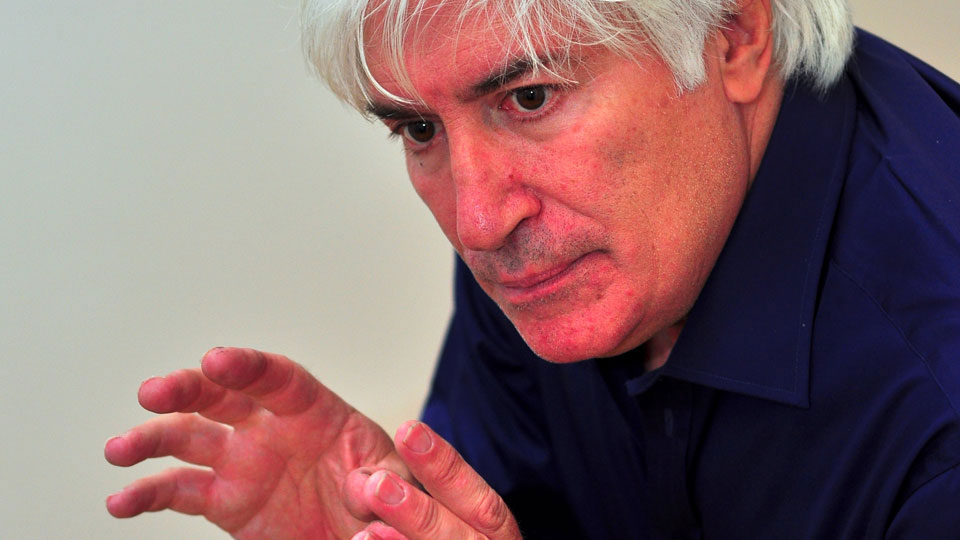We recently caught up with Jack Klaff, who is currently in rehearsals for Oedipus Retold, which opens at the Tristan Bates Theatre just off Shaftesbury Avenue on 14th January.
With a richly varied career, Jack is an actor, writer and academic. He’s played a James Bond villain’s henchman who was flung over a cliff by Roger Moore; he’s devised and performed award-winning solo shows, and he’s even written The Bluffer’s Guide to the Quantum Universe.
We asked Jack about different aspects of his life, and found out how he is approaching his roles in Oedipus Retold, about his appearance in Star Wars, and how his father came to repair Nelson Mandela’s watch.
Jack, how did you get into theatre?
We travelled a lot as a family. When I was a kid I was in Johannesburg and played some unbelievable roles when I was in my late teens, in mainstream plays like the Royal Hunt of the Sun, in which I played Atahualpa. I worked with British directors, and was also lucky enough to be involved with anti-apartheid theatre, where I worked with Donald Howarth of the Royal Court, who took me under his wing. For Peter Dews I played Orlando in As You Like It. I did a lot of radio with actors from abroad. I was then going to be a human rights lawyer, but I found there was a different kind of justice in storytelling. I finished my initial degree in law and then went to the Bristol Old Vic theatre school. From there I went into the company, and that led on to the Royal Shakespeare Company. By the time I was in my mid-20s I was lucky enough to have done some good theatre as well as the Star Wars movie and Space 1999.
Apparently you had two seasons with the Royal Shakespeare Company after your London debut which involved wild sex scenes.
That’s true! I was doing a show written by one of America’s leading playwrights Wallace Shawn, who wrote a play called A Thought in Three Parts that did indeed involve wild sex scenes, and it should have been closed – it was a wild hilarious great sex farce. And I did indeed go to the Royal Shakespeare Company after that!
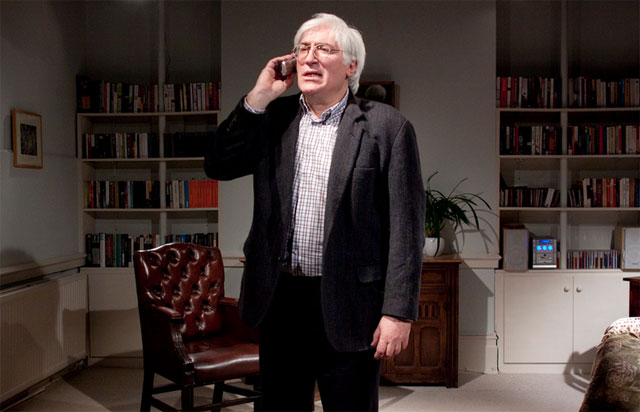
Did your background in South Africa inform your decision of wanting to be a storyteller?
Every single human being on earth is a storyteller. In the old days you’d tell objective truths through stories. Now in the post-modern world you reveal your subjective truths through stories. Whatever way you think of it, we are story-telling animals. What was interesting to me was that in the course of trying to become a lawyer, my own uncle was in prison at the time, and it became clear to me that it was really difficult through law to win a battle. Gandhi was the prime mover behind what Mandela became. Gandhi and Mandela, and practically every other great South African leader had legal training. The idea that you could use the rule of law, human rights and natural law to bring changes was pretty much chucked out of the window by every leader of the 1960s. So when I came to research the history of South Africa I said, let’s tell the story about how the old-fashioned ways of relying on the law and the rule of law became impossible. It was only after half a century that the African National Congress turned to violence. Mandela was a very forgiving man and a very affable person, but it was Mandela who said we’re going to have to fight them in some way. So they used targets that were not human, and so far as they could they continued to do so. Mandela was a deeply moral person. Let’s make no bones about it: Mandela regarded the dismantling of apartheid as a very just battle to fight.
Your father repaired Nelson Mandela’s watch, is that right?
That’s absolutely right. And I only really knew that long after my dad had died. People didn’t talk about it at the time. My mother told me, and she’s not a fantasist (laughs). She said this very good looking black guy came in and it was Nelson Mandela. My dad in those days had a watchmaking business quite near the old Johannesburg Supreme Court, so there were lots of lawyers in that vicinity. Mandela and Tambo, who was his partner both in law and in the ANC, had a law firm. So Mandela brought a lot of watches in: his own and his colleagues’. It’s an interesting way of viewing storytelling: time can heal a lot of wounds, and so I always imagined Nelson Mandela on Robben Island counting the minutes and the days and the years on this watch that my dad had fixed.
Tell us about Star Wars. That was your first screen role?
I’d done bits and bobs, but yes, Star Wars was my first big screen role. I don’t want to make out that I’ve had this fabulous screen and stage career – it’s not how it’s been for me. It’s more that I’ve been very lucky in the sense that I’ve done interesting work and said and written things that are regarded as important, and I stand by them rather than wanting to big them up.
I guess when you were making Star Wars, nobody knew it was going to be a big film and such a phenomenon.
Not at all. My agent kept calling it “Stan Wars”. People had no idea whatsoever. Even on set actors and the stars, who still say so now, were raising their eyebrows about the quality of the writing, and whether or not the dialogue was particularly sayable. As far as I was concerned, playing Red 4, I had two lines or whatever. I remember it because it was in a break for me. I’d finished a season at the Bristol Old Vic, and I had another job to go to, but during this break a job came along, for which I earned, incidentally, £250, and I was reading Turgenev’s Fathers and Sons. I thought I should educate myself. You sit around an awful lot on films…
Was it different with the James Bond movie, For Your Eyes Only, in which you played henchman Apostis? It was already a big franchise.
I knew it was going to be big because it was a Bond film, but my role in it was minor, but in those days you got extraordinary money. I was very lucky. I did a production of Troilus and Cressida in the theatre, and I was on it for fifteen weeks or so. About six of those weeks we didn’t rehearse so I was free to be in London and just hang out. I had a girlfriend at the time, and I went to the library every day, and out of that I wrote a play. On For Your Eyes Only I was earning a lot of money every week, whilst filming out in Greece. So I was able to write and read and just be at the same time. In those days you could earn some money without necessarily playing a big role. Now, they try and pack in players like that over a much shorter time. I was filming the Bond movie in Greece and London for eleven weeks. John Lennon was shot at the time I was making it. I can remember being aware of the world outside.
You were in The Disappearance of Lady Frances Carfax, an episode of the fondly-remembered Sherlock Holmes series with Jeremy Brett. What are your memories of that?
The Sherlock Holmes Society not so long ago invited me to give a talk, which I did as a performance. Sherlock Holmes puts Conan Doyle on trial for not being rational enough – because Conan Doyle believed in spiritualism and all that kind of thing. Sherlock Holmes berates him for it in this piece I wrote. It’s a nice thing to be invited to give this particular talk, the Richard Lancelyn Green Lecture, which is an after dinner speech that the Society holds annually. When I did it they were amazed by the fact that I’d played the Honourable Philip Green on both radio and television. Apparently it’s never happened that an actor’s played one role twice in different media. At the time I was writing a drama about the Channel Tunnel. We filmed up north in the Lake District. Jeremy Brett was a really remarkable person who was enormously thorough. He took it tremendously seriously. I remember telling a friend of mine how seriously he took it and she said, “Of course he’s taking it seriously, this is one of the great characters in fiction.” Of course, the Sherlock Holmes Society do not regard Sherlock Holmes as a fictional character. If you give a speech and say that Holmes is a fictional character they’d lynch you. He’s a real person! Earlier in my life I’d had a rather wonderful love affair with a woman who had been to drama school with Jeremy Brett. She was older than me. That touched Jeremy, that he had news of her. Jeremy was insistent on rehearsals which you don’t always get in television. It was quite something to do it. And John Madden, who went on to do all those films, was the director. So it was a very, very special job, and Jeremy Brett was incredibly encouraging.
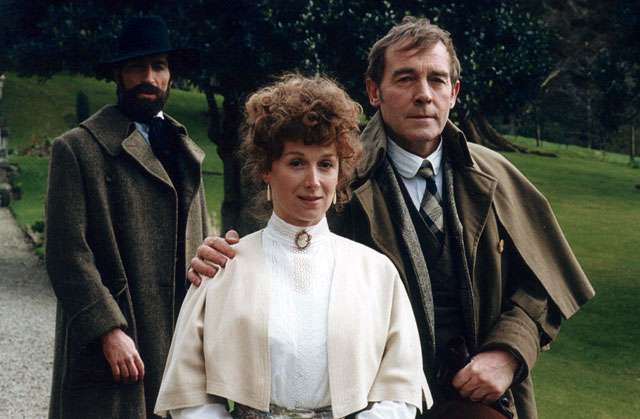
You have an academic life too, with Intelligence Squared and TEDx. Tell us about that.
Unfortunately the TEDx talk which is up online is a bit frustrating for me because the laughs were enormous that day. The way it’s presented now you can see people laughing and it’s quite funny, but I’ve not ever had laughter and applause like that for wisecracks. I do a certain amount of that. It all fits into the same thing. It’s partly storytelling and it’s partly saying, let’s take care and look at what the world may be like. So initially I was concerned with the dismantling of apartheid, and as time went on I became obsessed with other issues. Over the years I’ve written a trilogy about the power structures within male/female relationships. I’m of the generation where I came from a very patriarchal male chauvinist society in South Africa, and then I was confronted with very strong feminist performers and directors at the Liverpool Everyman and other places, so I became interested in that and wrote about it. I became interested in psychoanalysis, and then in science. All of them have something to do with how we think and what we do. In the case of science and technology, it’s also about what the world’s about to become, and that’s a very serious issue. I talk about it in straight speeches as well as in storytelling and drama.
An interest in science comes across in your writing too.
The shows I’ve written that pertain to science include one called Stand Up, which was about Heisenberg had said the observer affects that which is being observed. I was fascinated by that in terms of what it means in the theatre, where it’s obvious that the observer in the theatre affects that which is being observed. Then I did a show about a period in my life when I worked for three years in a lab in Brussels, and most recently I did Newton, a show about Isaac Newton. I also wrote the Bluffer’s Guide to the Quantum Universe, which they’ve given me the rights to do as a show as well.
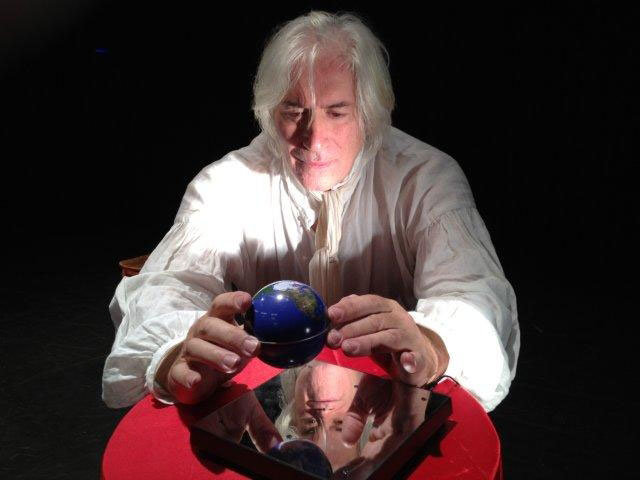
How did that come about?
I was at a party and a publisher was talking to me who at that time was publishing the Bluffer’s Guides, so she asked me to write a sample for one about the quantum universe, which I did, and she gave me the gig. It’s been rewritten and rewritten, most recently once again slightly longer. The stories are fantastic. The wonder of the phenomena is one thing and then there’s the great stories of the people involved, some of whom I was lucky enough to meet and talk to. Freeman Dyson, for instance, and Murray Gell-Man, who gave us the quark. All the stories are of those remarkable people. I also interviewed Steven Weinberg and Abraham Pais, who knew Bohr and Einstein very well. They had insights and stories. I’m interested in what those people were like. Newton is tricky enough, and I might do the Bluffer’s Guide.
You’ve worked with director Robert Gillespie before, haven’t you?
I first came across Robert years ago in a play called Spokesong, which is a wonderful pun: Sprechgesang is a Brechtian expression for speaking/singing. It comes from Brecht and not from Rex Harrison of course! It was a remarkable play set in a bicycle shop with wonderfully macabre lines like, “When I was saying a pet shop had been bombed, for one horrible moment it really was raining cats and dogs.” It was on at the King’s Head, so that was my first encounter with Robert in a fringe production with Annabel Leventon, Niall Buggy, two very good actors. Over the years he’s seen my solo work. We’ve had a range of discussions about male/female relationships, certainly about politics and science. He’s a bright guy. There’s something about Robert’s dedication.
Are you enjoying being directed by Robert for Oedipus Retold?
He’s fantastic old school, and what I remember from when I started in the business. He’s extremely thorough and doesn’t let you get away with anything! It’s tough. I improvise a lot in my solo pieces, but Robert doesn’t want you to deviate from the script at all, which is first of all a tribute to the author, and secondly it makes you much more reliable as far as your other actors are concerned, and most of the time the words chosen by the author are the best, so it’s tough; but I’m all in favour of it. This is a guy who works ten until six every single day.
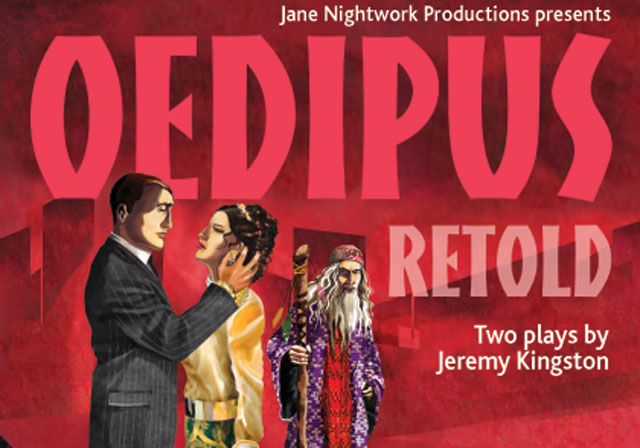
What parts are you playing?
I’m playing good parts in the production. Oedipus is the leading role and a whacking great part, though I’ve got some good stuff to do. I’m very happy to be doing what I’m doing because I think the stories are great. In Oedipus the King I’m playing Kreon, who becomes king, though he isn’t in this play. He’s the brother of Jocasta who is the wife of Oedipus. At that time, Thebes is run by Oedipus, Jocasta and Kreon, but the king is Oedipus. In the other play I’m playing Laius, who is Oedipus’ father (laughs) – and we know what happens to him!
A sticky end?
Sticky, but not in the way you would expect, because it’s a meditation on a different kind of person. In the actual myth, Oedipus and Laius are two hotheads and they encounter each other at the crossroads where three roads meet. Oedipus kills Laius not knowing he’s his father – that’s the key that Freud missed – Oedipus kills his father and has children with his mother – but he doesn’t know.
Are you liking Jeremy Kingston’s script?
There’s something very special going on, I think. There’s some things I’ve done a lot, like certain Shakespeare plays I’ve performed many times in different ways. I’ve done the Greeks, but not this particular story ever, and it’s mind-blowing. This is a two and a half thousand year old story adapted by Jeremy, but the story is so deeply powerful and goes to the very heart of things, which is why Freud was so affected by it. Jeremy Kingston has taken the thing and done wonders with it to make it accessible and conversational without sacrificing poetry or power. It’s really remarkable and it’s blowing my mind – which I don’t say lightly. I do an awful lot of plays where they’re pretty good, but there’s something so extraordinary, when you’ve done so many plays, that you should come up against something like this. You have a terrible predicament. It’s someone who didn’t choose these things who is thrust into this life. It forces you to think about the very deep stuff that goes on with human beings at the same time as what I’m sure Jeremy wants us to do, at the end of the evening, which is look at order, chaos and free will, and question whether or not the gods dictate your life. There’s a wonderful saying by a Jewish American writer Isaac Bashevis Singer, who said, “We have to believe in free will: we have no choice.”
Why do you think the Oedipus story continues to fascinate us?
There’s something very important in our culture and in the history of the theatre about Oedipus. It’s an incredible story. Somebody says, make it not have happened: that’s what drama should do. The story takes you to where you are lost and where you don’t want that to have happened, but you understand why it could have happened. It’s in the realms of really appalling stuff. We live in times when we’re re-examining our morality. It’s taboo stuff and it’s very powerful. It’s amazing that these great poetic writers addressed it.
We look forward to seeing it, and all the best with the rehearsals, Jack. Great to speak to you.
My pleasure.
You can see Jack Klaff in Oedipus Retold at the Tristan Bates Theatre from 14th January to 8th February. Tickets are on sale now through the Tristan Bates Theatre website.
See Jack Klaff’s website for more details about his work.


